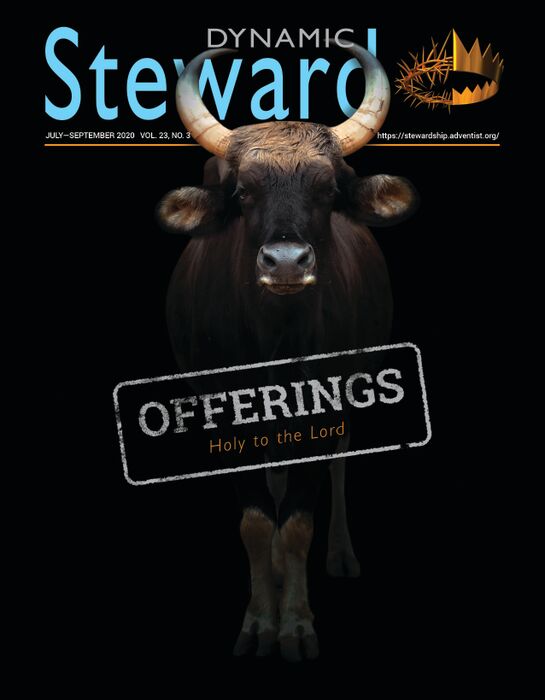When we try to understand offerings, we usually turn to the Pentateuch. We seldom consult the prophetic books, with the exception of Malachi. In this study, we will explore the teachings of the prophets about non-animal offerings. Our interest is prompted by the parallel that exists between us and Ancient Israel. Israelites of the Old Testament gave non-animal offerings, most notably from the produce of their harvest. We give offerings from our income. The study of the practices of Ancient Israel can shed light on the way we practice giving offerings today.
Not all prophets mention non-animal offerings. Only seven of them do so: Isaiah (1:13; 18:7; 19:21; 43:23; 57:6; 66:3, 20), Jeremiah (14:12; 17:26; 33:18; 41:5), Ezekiel (42:13; 44:29, 30; 45:1, 6, 7, 13, 15, 16, 17, 24, 25; 46:5, 7, 11, 14, 15, 20; 48:8, 9, 10, 12, 18, 20, 21), Joel (1:9, 13; 2:14), Amos (4:5; 5:22, 25), Zephaniah (3:10), and Malachi (1:10, 11, 13; 2:12, 13; 3:3, 4, 8). And not all prophets mention them the same way and at the same length. Zephaniah has just one verse, while Ezekiel extensively develops the notion of non-animal offerings. The presentation that follows is a brief exposition of the recurring themes related to non-animal offerings in the Old Testament prophetic books.
In Recognition of Who God Is, and Who We Are
When the prophets talk about non-animal offerings, they believe that such offerings are brought in full acknowledgment of God’s identity (Isa. 43:11) and actions: the eternal Creator (Isa. 40:28; 43:15; 44:24, 45:18); the One who does not change (Mal. 3:6); the One who constantly loves (Isa. 43:4; Jer. 31:3; Hos. 3:1), provides (Jer. 33:9; Ezek. 34:29), sustains (Isa. 41:10), cares (Zech. 10.3), helps (Isa. 41:13; Hos. 12:6), protects (Isa. 31:5; Zech. 9:15; 12:8), and is a refuge (Isa. 26:4; 44:8; Nah. 1:7); but also the One who calls for repentance and who forgives (Isa. 16, 17; Jer. 31:34; Ezek. 14:6, 7; Zeph. 3:15-18; Mal. 3:10-12), the One who proposes changes and who is able to transform human lives (Isa. 41:14; Jer. 30:17; Zeph. 3:9, 19), the One who judges (Mic. 5:6-8; Zeph. 3:9, 11, 12, 15, 19, 20; Mal. 3:16-21).
Offerings also acknowledge who we are: human beings; created; dependent on the Creator for life, sustenance, forgiveness, transformation, hope, and future. One cannot choose to give wholehearted offerings if one does not recognize one’s need of the Lord of hosts (Isa. 18:7). It should thus not be given mechanically, but always in full recognition of what God does for humankind (Isa. 11:9; 18:7; 66:20; Jer. 17:26, 33:11; Zeph. 3:14).
In Gratitude, Joyfully, and as an Act of Commitment
As already mentioned, non-animal offerings are always to be freely given as a humble expression of our gratitude toward our Creator, Provider, and Lord. If not, God does not accept the offerings (Jer. 14:12; Amos 5:22). Furthermore, offerings are not meant to gain God’s favor (Joel 2:14). God approves when they are humbly and freely given in worship according to what He requires (Jer. 4:1-3; Joel 1:14; 2:12, 13). He is the only One to decide when and how He will bless His faithful worshipper. But He promises not to leave His worshipper without sustenance and blessings (Mal. 3:10-12).
God loves a cheerful and joyful giver. A faithful worshipper recognizes that God always gives things that he or she will never be able to pay back. Jeremiah highlights three reasons for a joyful giving of offerings: (1) He is the “Lord of hosts,” (2) God’s “good[ness]” and “steadfast love,” (3) the restoration of the “fortunes of the land as at first” (Jer. 33:11).[*] Offerings are not be limited to monetary donations. They can be property, time, work, or ourselves (Ezek. 45:1, 13-16; 48:18, 19).
Ultimately, offerings are one of the means provided by God to choose Him, acknowledge Him as first in our lives, and to keep a lasting relationship with Him (Isa. 43:10; 44:6, 8; 45:9; Jer. 24:7; 30:22; Ezek. 20:40; Zech. 8:8; Joel 2:27; 3:17; Mal. 3:16-18). The prophets foretold that people from the extremities of the earth would come to worship God (Isa. 18:7; 60:4, 6, 7; Zeph. 3:10; Zech. 14:16, 17; Mal. 1:11). And in coming from afar, traveling for several days or even weeks, they show they are ready to leave everything behind to meet God. Since the unchanging Lord of hosts always cares, provides, and sustains, as children of God we ought to learn, to receive, to experience, and to accept God’s relationship of love, care, salvation, and lordship. Only through this kind of living relationship can He help us to learn to worship Him correctly and completely. While we worship, we choose to bring a part of ourselves (the best!) to our Lord and Redeemer.
Systematic, Proportional, and at a Defined Place
Spiritual events, such as a sabbath, a new moon, Jewish festivals, and any other assemblies (Isa. 1:13, 14; Ezek. 44:24; 45:17; 46:3; Amos 5:21; 8:5, 10), provided opportunities for the Israelites to make sacrifices, to return tithe, and to give grain offerings (Heb.: minḥāh) (Isa. 1:13; Jer. 14:12; 41:5; Amos 5:22, 25; Mal. 1:10, 11, 13), even the best frankincense (Jer. 6:20). This shows that they knew what the laws required from them toward God.
The returning of tithe and bringing of offerings was meant to thank God for increased blessings. It was regular and systematic because the people understood that they should not come to God empty-handed. Some felt so blessed that they would bring extra freewill offerings to God (Heb.: nəḏāḇāh) (Amos 4:4, 5; 5:22, 23). This may suggest that they gave something beyond tithes and regular offerings.
Ezekiel foretold a time of restoration in which everything would be renewed through the presence of the Lord. The comprehensive description of the New Jerusalem and its future Temple and services is of particular interest (Ezek. 40-48). Something new will be required from the people. There shall be a portion of land for the prince (Ezek. 45:7, 8), the “shepherd” of God’s people (Ezek. 34:23, 24). Apart from the priests’ portion (Ezek. 44:29, 30), all people shall make offerings to the prince and his descendants (Heb.: ṯərûmāh) calculated in terms of proportion: about 1/60 for cereals, 1/100 for oil, and 1/200 for sheep (Ezek. 45:13-16). Yet, such offerings or taxes seem not to be for the prince’s sustenance. In return, God gives the prince the responsibility “to furnish the burnt offerings, grain offerings, and drink offerings, at the feasts, the new moons, and the Sabbaths, all the appointed feasts of the house of Israel: he shall provide the sin offerings, grain offerings, burnt offerings, and peace offerings, to make atonement on behalf of the house of Israel” (verse 17). Henceforth, this proportional offering will be for God (verse 15). God will require of the prince for each appointed feast an exact amount of offering (Ezek. 45:18-46:18), and sometimes “as much as he is able” (Ezek. 46:5, 7). It would be the duty of the prince to provide for the grain offerings (Heb.: minḥāh) of the people. This passage of Ezekiel hints that offerings should not only be freely and wholeheartedly given of what we can offer but also be a percentage of our income (Ezek. 45:13-16).
The prophets do not enunciate a fixed percentage for offerings as for the tithe, but rather, such percentages should be decided by the giver. Moreover, like in Joel’s time, when we face economic and financial difficulties we may wonder what offerings can be given. Whether our economic situation goes up or down, a systematic self-chosen percentage of our revenue can certainly help to decide what to give to the Lord. In bringing faithfully this systematic, self-chosen percentage of our revenue, we can continue to provide and do our part in a (very) small or big way for God’s house and help the advancement of God’s work (Joel 1:9, 13).
The prophets further highlight that if offerings are to be given to God, such offerings are not for God’s sustenance. But they are to be given to His house (Isa. 18:7; Jer. 17:26; 33:11; Ezek. 42:13; Joel 1:9, 13, 14; 2:17; Mal. 1:7; 2:13; 3:10) for its services and the sustenance of the priests, those He has divinely appointed to fully serve in its services (Jer. 33:18; Ezek. 44:29, 30; Joel 1:9, 16, 17). It should always serve to the advancement of God’s house and work. In return, it is the responsibility of the priests to always learn, teach, remind, God’s people about who God is, and His requirements (Ezek. 22:26; 44:15, 16, 23, 24; Mic. 3:11; Mal. 2:8, 9).
Wrong Motives for Giving
Nevertheless, there were some issues with the systematic character of non-animal offerings (Heb.: minḥāh): the prophets repeatedly told the people that God did not want their grain offerings. The main reason was their formalism in giving offerings (Isa. 1:11; 66:3, 4; Jer. 14:12; Amos 8:5; Mal. 2:11, 15), and their spiritual apathy and syncretism (Isa. 43:22-24; Zeph. 1:5). Many times, the people gave the amount required but forgot its purpose and brought polluted offerings (Mal. 1:7). They even seemed to have brought such offerings with contempt (Mal. 1:10, 13, 14). They gave and brought their grain offerings in thanksgiving to God for His blessings. Yet, these offerings were the result of social injustice and abuse of the poor (Isa. 1:17, 23; 5:7; 66:3; Jer. 22:13-17; Amos 2:6-8; 5:11, 24; 8:4-6; Zeph. 3:1; Mal. 3:5). God would condemn His people’s heart as divided, insincere, or seeking its own interest.
Some other times, the prophets reproached the people for the absence of offerings. The people misappropriated God’s offerings, even with the help of corrupt priests (Ezek. 22:23-31; Zeph. 3:3, 4; Mal. 1:8). They would use them for their own purpose (house[hold], or business; Amos 8:5), or even for offerings to idols (Jer. 7:30, 31; 16:11; 18:15; 32:29; 44:2, 8, 17, 18; Ezek. 7:20; 8:3; Amos 2:8; Zeph. 1:4-6). Idolatry was therefore systematically condemned by the prophets. When non-animal offerings were given to God insincerely, or were given while exploiting the weak, or even given to something other than God Himself, the prophets pointed out to the people that they did not really know God. They highlighted how much people mistrusted God, belittled God’s sustenance for them, and lacked confidence in God’s future providence (Isa. 43:11; Jer. 6:12-19; Mal. 1:2-5).
A Lasting Ordinance
Many prophets foretold of a time of restoration and renewal instigated by God among His people. God’s transformed people (from Israel’s line or by adoption; cf. Isa. 18:7; 19:21; 45:14; 56:7; 60:7) would choose to come back to Him as their personal and only God. As such, they would willingly bring the best of what they had to Him as offerings (Heb.: minḥāh) (Isa. 19:21; 45:14; 56:7; 60:7; Ezek. 44:29; Zeph. 3:10; Mal. 3:3, 4), as tribute (Heb.: shay) (Isa. 18:7), as thanksgiving offerings (Heb.: ṯôḏāh) (Jer. 17:26; 33:11), as the produce of the firstfruits (Heb.: bikkûrîm), and as contributions or heave-offerings [Heb.: ṯərûmāh]) (Ezek. 44:30).
Conclusion
The Lord of hosts entrusts humans with different kinds of possessions: wealth, property, time, even one’s own life. All that we are and have are not ours but gracefully provided by God. The prophets remind us, as stewards, that we ought to use everything for God’s honor. Furthermore, offerings are not just fulfilling a requirement from God. They are the external expression of a sincere, thankful heart, based on a voluntary chosen relationship with our Creator.
[*] Scripture quotations are from The Holy Bible, English Standard Version, copyright © 2001 by Crossway Bibles, a division of Good News Publishers. Used by permission. All rights reserved.


